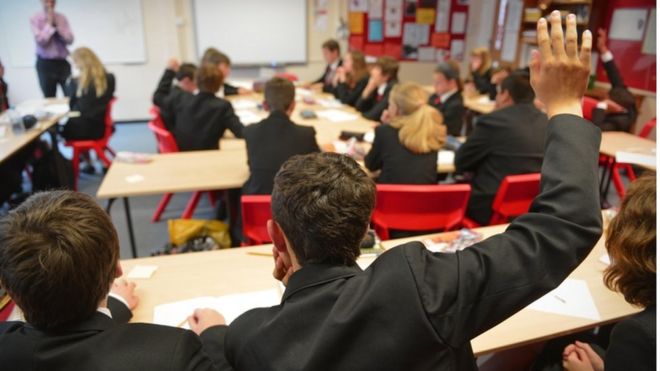
A small but rising number of schools in England are diverting money meant for disadvantaged pupils to offset budget cuts, says an education charity.
Of 1,600 teachers polled for Sutton Trust in March, 6% said pupil premium money was used to offset budget cuts, compared with 2% the previous year.
The charity’s chairman, Sir Peter Lampl, described the trend as worrying.
But the government said the poll showed the vast majority of schools were using the cash to support the poorest pupils.
Educational boost
The pupil premium grant was introduced by the coalition government in 2011 to boost the education of disadvantaged children.
It is paid to schools for each pupil who is eligible for free school meals or who has been eligible at any point during the previous six years, or for pupils who have been in care for more than six months continuously.
This year it is £1,320 for primary pupils and £935 for secondary pupils.
Schools are free to spend the money as they see fit but must be able to show how it is helping children from low income families.
The survey, carried out by the National Foundation for Educational Research on a representative sample of teachers in primary and secondary schools across England, shows the money used on a range of initiatives including:
smaller classes
more teachers or teaching assistants
one-to-one tuition
early intervention and mentoring
a broader curriculumBut a comparison with the same survey from last year shows the proportion of teachers who said the money was being used for “offsetting budget cuts elsewhere” tripling to 6%.
“It is worrying that a growing number of schools feel they have to use funding for disadvantaged pupils to offset budget cuts,” said Sir Peter Lampl.
“The pupil premium is a key lever for raising the attainment of disadvantaged pupils and it’s vital that it continues to be focused on their education.”
National Association of Head Teachers’ General Secretary Russell Hobby said Ofsted inspections already include checks on how effectively schools use the grants.
“This gives school leaders guidance and parents the confidence that their children are being helped.
“The real question raised by the Sutton Trust report is the strain that school budgets are under.
“Chronic underfunding means that school budgets are at breaking point forcing some schools to make tough choices that really they shouldn’t have to, said Mr Hobby.
School budgets
A Department for Education spokeswoman said the government trusted schools to use the money to best meet the needs of their pupils and was “pleased this report shows the vast majority of school leaders feel they can target it to support their poorest pupils”.
From September, schools will be required to publish their pupil premium strategy on their websites, said the spokeswoman, adding that they should not need to use the money to offset cuts.
“We have protected the core schools budget in real terms, so that as pupil numbers increase so will the amount of money in our schools.
“At the same time, we are consulting on a national formula to make funding fairer and address the historic unfairness in the system so funding is matched to need.”


